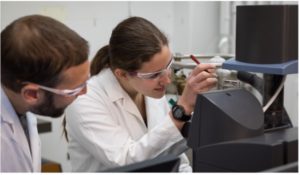Home⁄ Diversity
Diversity
Critical to fulfilling our scientific mission, the CCMR works closely with Cornell University and funding agencies to ensure a welcoming environment for staff, students, researchers, and faculty. Making higher education and scientific research accessible to all people is not just morally correct; increasing evidence shows that enhancing diversity, equity and inclusion in science leads to better scientific outcomes. Cornell faculty and staff welcome diverse perspectives and view them as important to enabling new scientific approaches and discoveries.
Compared to the overall population, many science and engineering fields are still not diverse. An important part of the CCMR mission is to enhance participation of groups traditionally underrepresented in science. The Center accomplishes this with a variety of programs, at the K-12, undergraduate, and graduate levels, summarized below. Please contact the members of the CCMR DEIA Committee if you have any questions.
CCMR DEIA Committee
- Prof. Lynden Archer, CBE Faculty and Dean, College of Engineering
- Prof. Nicole Benedek, MSE Faculty
- Ms. Anitra Douglas-McCarthy Director of Graduate School Recruiting Office
- Dr. Kelly Luo Postdoctoral Associate
- Prof. Atieh Moridi, MAE Faculty
NSF-funded PREM (Partnership for Research and Education in Materials Research).

N.C. A&T faculty and students performing XPS analysis with Dr. Darrah Dare, CCMR Facility staff member.
Titled “Collaborative Research and Education in Energy Materials (CREEM),” this partnership with researchers at North Carolina A&T will develop low-dimensional titanium oxynitride-based materials capable of supporting energy conversion reactions. The CREEM team will focus on broadening the participation of underrepresented African American students in graduate education leading to terminal degrees, by engaging students in innovative materials research, education, and outreach programs. High-school, undergraduate, and graduate students are participating in this program.
CCMR Analytical Facilities

CCMR facility staff work one on one with researchers to provide hands on training.
The CCMR Shared Instrument facility houses a wide array of world-class instruments such as electron microscopes, spectrometers, diffractometers, and more. Importantly our facilities provide collaborative space for many researchers which include researchers from industry, national labs and academia outside of Cornell and range from undergraduates to industry scientists. The CCMR facility staff are a diverse group of expert staff who promote research by teaching researchers how to safely use instruments and how to utilize instrumentation to get the best possible analyses. Our mission is to make analytical resources available to all researchers and our staff are able to offer in-person hands-on training, written instructions and in some cases, video/remote training. We welcome the opportunity to work with any researcher. CCMR knows that everyone brings unique capabilities and valued perspectives to research and education. Our goal is to promote accessibility and inclusion in an intentional and forward-thinking way. We are determined to continually break down any and every accessibility barrier that students may encounter so that everyone has an opportunity to succeed.
